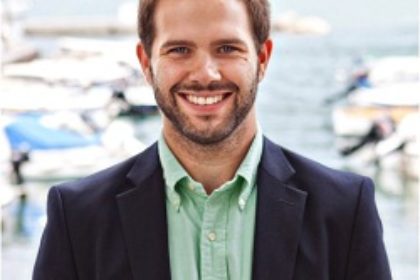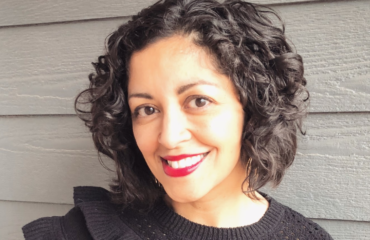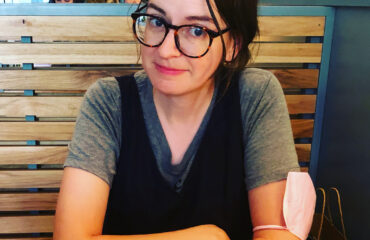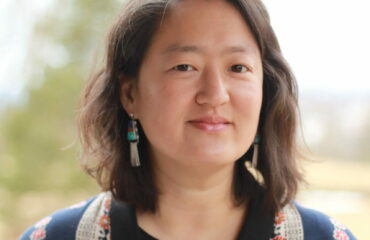Late to the Search Party is the debut collection of Steven Espada Dawson, exploring the individ...

JUNE INTERVIEW WITH STEVEN ESPADA DAWSON

MAY INTERVIEW WITH SOPHIA TERAZAWA
When readers first meet the narrator of Sophia Terazawa’s novel, Tetra Nova, published by Deep ...

FEBRUARY MONTHLY: INTERVIEW with CLAIRE HOPPLE
From the first sentence of Claire Hopple’s latest novel, Take It Personally, you know you’re in...

JANUARY MONTHLY: INTERVIEW WITH MARIA ZOCCOLA
Any reader with even a cursory understanding of Greek mythology will recognize her name: Helen ...

DECEMBER MONTHLY: INTERVIEW WITH JIMIN SEO
Jimin Seo is the author of OSSIA, his debut collection of poetry. Winner of the The Changes Pre...
Between the Lines: An Interview with Wesley Rothman

In this installment of “Between the Lines” we talk with Issue 5 contributor Wesley Rothman about poetic process, the creative relationships between different art forms, and the cultural state of contemporary poetry.
.

FWR: Your poetry likes to locate itself at the intersection of different artforms: blues music and lyrics, for example, or the relationship between text and visual art. Is this just a part of your aesthetic or the result of a conscious poetic project on your part?
WR: I think it’s a little bit of both. I’ve always been addicted to music and visual art, and maybe more importantly, the artists that create these mediums. Clearly I’m in love with Frida Kahlo, and I don’t think you can talk about Frida without at least thinking of Diego Rivera. I’m also obsessed with Nina Simone and David Bowie (who were dear friends), as well as Jean-Michel Basquiat, Billie Holiday, Van Gogh, ’90s hip-hop artists, and Salvador Dalí (who was an intimate friend of Federico García Lorca’s). So I’m obsessed with these people, the art they made, what they did to society and history, and in terms of a conscious poetic project, I’m interested in how they are remembered, what their legacies look like and become over time. I want to make poems that serve as snapshots of these legacies, or make us wonder about legacies and how they morph. Art to honor art and artists. It’s interesting that we make poems about figures and by doing so we may be affecting, in some small way, how future generations remember these figures.
FWR: That’s interesting, especially since it’s still fashionable to talk about poetry being this opaque, elitist, stodgy art form that’s fading out of relevance. How do you respond to claims like that?
WR: It is fashionable, isn’t it? This has been on my mind for quite some time, and I’ll try to compress my thoughts about these sorts of claims, but it will be a bit oversimplified, I know. It seems to me that most people making claims that poetry is opaque, elitist, and stodgy say this because they don’t understand the craft decisions of the poets they read (if they do read any). I think “they” also say this because they have been miseducated about what poetry is, how it happens. People who tear poetry, as an art form, down do so because they don’t understand and are frustrated by this lack of understanding, like not understanding a Jackson Pollack painting. People who aren’t interested in investing time and energy to understand artistic/historical/theoretical context typically dismiss the work at hand in favor of something easier. I frequently teach a Susan Sontag essay/excerpt about boredom (or frustration) to my students to wrestle this disposition. This brings me to a cultural and historical consideration. When Eliot wrote “The Waste Land,” people thought it was crazy, “opaque, elitist, stodgy, and fading from relevance,” yet it’s absolutely canonical for us. I think younger generations love Langston Hughes and Robert Frost because they rhyme, and that’s what they expect of poetry. Younger generations also love Bukowski and Ginsberg, because they’re rough and bombastic and bold, things that younger people seem drawn to like honey or bright light. In short, I think poetry was better, or more commonly, taught to generations 50+ years ago. And if it wasn’t that much more prominent in education, it was more prominent at home; parents read poetry for leisure. As education and home exposure of poetry has declined, as public recognition of poets has declined (or turned attention toward media figures), new generations are less prepared to tackle the challenge and rigor of poetry, as they are with other difficult or abstract artforms or topics. This is obviously a generalization, but I think it’s demonstrated by widespread practices like No Child Left Behind which prefer mastery and memorization of concrete facts, typically hard sciences and “hard-ish” social sciences, rather than strengthening of critical and independent thinking skills. All of this to say that I think our society has in many ways conditioned new generations to feel this way about poetry. ON THE OTHER HAND, I also think those who have been encouraged to read and internalize and wonder about poetry or other challenging art forms are coming into the arena more than ever. Even though many people feel poetry is becoming obsolete, there has been an incredible surge in recent decades of new, young poets, journals, online forums, reading series, MFA programs, high school poetry programming, higher educational development with creative writing as a valuable and valued process. Poetry is thriving in many ways in spite of a cultural preference for simplicity/entertainment/empty wittiness.
FWR: It’s frustrating, how otherwise complex and fascinating poets end up anthologized and then taught at the secondary level in the most insipid ways. Gwendolyn Brooks comes to mind. Are there any writers whose work you wish was taught differently?
WR: I wish people would teach more than “We Real Cool.” I wish anthologies would include more of her poems. Sadly, I think most poetry and literature is simplified and bastardized at the secondary level. Contemporary education standards require hard answers, meaning, and measurability. Poetry and literature actively defy these things, I think. I can’t think of any writers or poets I wish were taught differently, per se, mostly because I can’t say they’re taught in universally similar ways, but I wish writing and reading were taught differently, and I wish poets other than Whitman, Dickinson, Eliot, WCW, and Frost were taught in high schools. It’s important to become familiar with the canon, but teach high school students poetry that speaks about their world, not the world of their great-[great-]grandparents. Teach them Natalie Diaz, Marcus Wicker, Amiri Baraka, Wallace Stevens, Roger Reeves, Matthew Zapruder, Natasha Trethewey. Something that I can’t put my finger on at the moment is making history and historical context difficult to process for younger generations. We have to find a way to help young people find poignance in what happened 200 years ago before we can help them find poignance in Coleridge, Wheatley, Blake, Austen, and Wordsworth.
FWR: A lot of us have extremely complicated relationships with the canon. You wrote a great essay about Terrance Hayes responding to Wallace Stevens and that mixture of resistance and devotion, a kind of helplessness in the face of an otherwise problematic writer’s tremendous talent. Has that been something you’ve had to personally navigate?
WR: That’s a great way to describe it! I think everyone’s relationship with the canon is indeed extremely complicated, based on breadth of exposure, taste, historical and social perspective, and the list, I’m sure, goes on. Thanks for the kind words about that piece. As I become more and more familiar with Stevens, I feel a little bit of what Hayes is talking about in his poem—primarily on an ideological level. I don’t know that I’ve navigated this elsewhere. Every now and then I come across a canonical or contemporary poem that is problematic in its content or perspective, but well-crafted. I think this is less expansive than what Hayes is wrestling. In other words, Stevens was generally and consistently bigoted, but I think when I experience this conflict of resistance with admiration of craft, it’s more often a single poem (rather than a body of work or a person’s problematic social beliefs) demonstrating an uninformed perspective. I think this comes down to a person’s understanding of themselves and their beliefs. I don’t know that Stevens was problematic in many ways, but his work does demonstrate on occasion a very problematic social belief system concerning culture. Not all of his poems present this bigotry, but it’s there enough. I can’t think of another poet with whose work I’ve encountered this in the same way, but there may be other poets whose personal views I find problematic, shown in their work or not. (tough question).
FWR: It’s a really tough question. You mentioned before that you include social justice as a major priority in your writing and your teaching. How do arguments about “art for art’s sake”, or “divorcing the art from the artist” strike you, then? There have been some pretty high profile versions of this debate in the news recently.
WR: I have fishy feelings about “art for art’s sake.” I don’t think we just make it to have it in the world, that it comes from some impulse simply to create. Something drives us to make art. The specifics of that something are important and are motivated by vibrance and burning and terror within us. Art’s about passion or curiosity, and I think my passions and curiosity are served by poem-making. I kind of like the idea of divorcing art from the artist…once it’s been made. I don’t think an artist should blankly make art, but I think readers or viewers should absolutely divorce the art from the artist. That is, the art can’t help but be divorced from its maker. This happens when a poem is published or a sculpture sits in a gallery or museum. The artist isn’t alone with it anymore, the relationship is publicized and a wedge comes between the piece and the artist’s intentions or context. In many ways, I think, the artist abandons the piece when this happens, and vice versa, I suppose.
On a similar but different note, when making a poem, I think losing some control is usually, if not always, a good idea. Improvising with language, sound, syntax, and form leads to some of the most brilliant mistakes, phrases and verbs and metaphors that never could have come through a controlled hand or mind. It’s also important to not know everything that’s going into a poem, to search for something yet unknown, to be dumbfounded sometimes by the language that comes into a line, to discover something. All of this comes from a very personal drive to make a kind of art, and I think the art is populated by passions, obsessions, questions, and a kind of alchemy.
FWR: Speaking of passions and obsessions, your poem in Issue 5 was entirely about Frida Kahlo and, to a lesser extent, Diego Rivera. Why Frida? Are you more interested in her artwork, her status as a cultural icon, or something else entirely?
WR: She’s stunning. The image of herself that she painted over and over in various scenes and circumstances is stunning. Her metaphors are stunning. Her paintings’ color is stunning. The only other visual artists that have struck me the way she has are Basquiat and Van Gogh, and maybe Gerhard Richter. She’s a wonderful bundle of complexity, both artistically and personally. Her personal life is tragic and richly beautiful. Her work is like nothing else before or since. For me, she has a voice that is like a really well-done love poem, full of visual rhythms, a voice loaded with feminism and honesty and force.
FWR: So you respond to feminist voices (which is awesome). Do you view yourself as a feminist writer?
WR: I appreciate feminism as a concept and practice. I’ve learned a great deal, and I hope adopted a feminist lifestyle, from reading, thinking about, internalizing, and trying to practice feminist ideals. But I don’t know that I’d call myself a feminist writer. I’m not necessarily trying to convey feminist ideas with my poems, but I hope they are there. I think I respond to voices of witness in general. A pillar of my teaching and writing philosophies is “diversity and inclusion,” or striving for better social equity. I’m particularly interested in examining and undoing white male privilege. James Baldwin is one of my greatest influences/guides/sparring partners. He has challenged me and taught me more than anyone. Kiese Laymon, bell hooks, Jake Adam York, Danez Smith, Jericho Brown, Lucille Clifton, Natasha Trethewey, Yusef Komunyakaa, Terrance Hayes, Carl Van Vechten: these writers tug and mold what I’m most interested in, and I think, I hope, some of my writing adds to this wide conversational awareness and art of social engagement.
FWR: You mentioned early experiences with Whitman and Dickinson in another interview, with The Missouri Review. You could almost call them diametrically opposing forces in American poetry. Do you feel that your own writing has developed a position between these two influences?
WR: The things that Dickinson does with language—the sounds and semantics—are bewitching, not all that different than what Frida accomplishes with meaning/message/metaphor and color. Whitman messes with syntax and line, but his poems have always been, for me, about washing this thick layer of water over whatever subject he happens to be exploring. His poems feel like heavy blankets that cover everything and cozy me into a way of thinking or feeling. If his poems were paintings they would be gobbed with oil, lunging off the canvas like a Van Gogh. I don’t know that my own writing has developed between these two poets. Whitman has been more present than Dickinson. But I think I’m balancing the scales, discovering and revisiting more and more of Dickinson as time passes. Everyone who hasn’t read some of Leaves of Grass lately, or has forgotten the sting of Dickinson’s metaphor, should pick up or buy a book soon, now.
FWR: Have you found that working in an editorial capacity, especially for a respected publication like Ploughshares, has influenced your own development as a writer?
WR: I think editorial work has done a lot for my own writing, but most notably it has helped me gain a sense of distance or objectivity with my own work—somewhat. It’s incredibly challenging to forget “what you meant” or avoid defending writerly decisions during the revision process. I think editorial work has served as a reminder to treat my own writing as I do that of submitters. Expect the work to be well-rounded, polished, poignant, well-crafted, and meaningful. I don’t know if all my writing accomplishes this, but editorial work has helped me reach for this.
FWR: What poetry are you reading currently?
WR: Currently and very recently: Jake Adam York’s Abide, Tarfia Faizullah’s Seam, David Tomas Martinez’s Hustle, rereading Leaves of Grass, Lisa Olstein’s Little Stranger, Roger Reeves’s King Me, Ruth Ellen Kocher’s domina Un/blued, rereading Terrance Hayes’s Lighthead (always rereading it), Shane McCrae’s BLOOD, Victoria Chang’s The Boss, Harryette Mullen’s Urban Tumbleweed, rereading Natalie Diaz’s When My Brother Was an Aztec.
FWR: What poetry do you really dislike?
WR: I’m actively trying to expand my taste, but the kinds of poetry I’ve disliked are overly casual in tone, gimmicky, weak prose in a really bad poetry mask (i.e. because a thing has line breaks doesn’t make it a poem), precious in the worst ways, lackluster without a purpose, and/or archaic-sounding for supposed fancy’s sake.
FWR: You already mentioned the difficulty of distancing yourself from your own work. Could you talk a little more about your writing process?
WR: My process isn’t very interesting, I don’t think. It’s very difficult to force myself to write. So instead, I read and search for things that get me thinking, then poems need to come out, and I’m often excited or hopeful for what I’ve first written down. After a week or so, I usually start to notice what needs to be tweaked, but more often, I leave the poem alone for awhile (a month, six months) or I submit it, and when I come back, sit down with it, I realize what’s terrible and am more comfortable slicing and adding and moving and changing. And I’ve recently noticed something about my own process that I never hear poets talking about: sometimes poems just don’t work out, no matter the tweaking or full-scale bombardment I give them. Sometimes poems need to be abandoned. This sounds an awful lot like giving up, but I think it’s more about learning from unsoundly built poems. It might seem daring or revolutionary or intriguing to build a house out of shoes, but no matter how you arrange that structure, that shit’s gonna fall apart.
FWR: Maybe no one talks about that because they don’t like to acknowledge that they do it all the time. There’s a kind of folk wisdom in poetry circles that everything is useful, that you can mine even your worst failures for the seeds of new, great poems. It’s almost more revolutionary to admit, “Yes, I tried to build a house out of shoes. That was idiotic. Moving on!” Why do you think poets are so uncomfortable doing this?r
I think there’s something to mining the worst failures for seeds of new, great poems, but it can sometimes torture you in unproductive ways. I’ve tried to make new poems from failed bits, but the phantom of what I wanted the original poem to be and do was always hanging over the new work. Maybe that’s a failure on my part as poem-maker, but I couldn’t shake it. I think it’s sometimes useful to hang onto those remnants, but other times cracking on is refreshing. I don’t know if poets are uncomfortable doing this, but maybe it’s just a matter of being uncomfortable admitting they do this. If they are uncomfortable abandoning a poem, maybe it’s a matter of proving their resourcefulness, maybe it’s a matter of intimacy. I often hear poets refer to their poems as children, and I hope everyone is uncomfortable abandoning their children, barring extreme or peculiar circumstances. I guess this means I don’t think of my poems as children.
Read “Bathing with Frida” in Issue 5
|
More Interviews |


